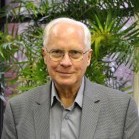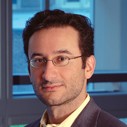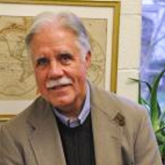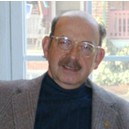PEOPLE
We are a growing and diverse group of researchers, educators, practitioners and students, housed at various Penn entities, but united in our interest in sustainable energy solutions for the future. We welcome new members, so if you are interested in joining us, please contact the EnerFront coordinator Svetlana Milutinović.
Faculty
 Igor Bargatin
Igor Bargatin
Class of 1965 Term Assistant Professor
Department of Mechanical Engineering and Applied Mechanics (MEAM)
Igor Bargatin received his Ph.D. in Physics and Electrical Engineering in 2008 from California Institute of Technology and his undergraduate degree in Theoretical Physics in 2000 from Moscow State University. Igor’s research interests are focused on micro- and nanoelectromechanical systems for new applications in energy conversion, optics, and smart materials. He applies his knowledge of physics and engineering disciplines to design and test new types of devices, such as microfabricated thermionic energy converters, which convert heat directly to electricity at very high temperatures by literally boiling electrons off a surface and using them as a “working fluid” in a heat engine. His multidisciplinary research group works at the intersections of mechanical engineering, electrical engineering, materials science and engineering, and applied physics.
Expertise: Micro- and Nanomechanics | Thermal Sciences and Energy Conversion | Mechanics of Materials
For more information visit: http://bargatin.seas.upenn.edu/
 William W. Braham
William W. Braham
Professor
Department of Architecture
Bill Braham is a Professor of Architecture at Penn’s School of Design, where he is currently Director of the Master of Environmental Building Design program, and Director of the TC Chan Center for Building Simulation and Energy Studies. He received an engineering degree from Princeton University and an M. Arch. and Ph.D. Arch. from the University of Pennsylvania, where he has taught since 1988. At Penn, he teaches graduate courses on ecology, technology, and design. At the Chan Center, his most recent projects have been the Sustainability Plan, Carbon Footprint, and Carbon Reduction Action Plan for Penn.
Expertise: Building Energy Consumption and Modeling | Energy Efficiency | Carbon Accounting
For more information visit: https://www.design.upenn.edu/architecture/graduate/people/william-w-braham
 Jane Dmochowski
Jane Dmochowski
Teaching Faculty
Department of Earth and Environmental Science (EES)
Jane Dmochowski received both her Ph.D. and her M.S. degrees in Geophysics from California Institute of Technology, and she also holds a B.S. degree in Geophysics from the University of California at Santa Barabara. She began teaching at the University of Pennsylvania in 2006 and became the Assistant Director of the Earth and Environmental Science undergraduate programs in 2008. She helped to start the Vagelos Integrated Program in Energy Research (VIPER) in 2012, has served as a freshmen advisor since 2008, is a co-chair of the Environmental Sustainability Advisory Committee’s (ESAC) Academic Subcommittee, helped to develop and run the Integrated Sustainability Across the Curriculum (ISAC) program, and teaches college classes in Earth Science, Environmental Chemistry, Oceanography, Environmental Case Studies, Research Methods, and Remote Sensing.
Expertise: Marine Geophysics | Remote Sensing | Science Education
For more information visit: http://www.sas.upenn.edu/earth/people/jane-dmochowski/
 Reto Gieré
Reto Gieré
Department Chair and Professor
Department of Earth and Environmental Science (EES)
Reto Gieré received his PhD in Earth Sciences at the Swiss Federal Institute of Technology (ETH) in Zurich and his Venia Legendi at the University of Basel in Switzerland. He has had extensive international research and teaching experience through his posts in the U.S., Canada, Australia, Italy, and Germany. He is an editor at Journal of Petrology and Chief Editor of European Journal of Mineralogy, and is a Fellow of the Mineralogical Society of America, as well as the Geological Society of London. His research interests lie in the fields of mineralogy, petrology, environmental geochemistry, and health impacts of earth materials.
Expertise: Environmental Geochemistry | Energy and Waste | Mineralogy and Petrology | Health Impacts of Atmospheric Pollution
For more information visit: https://www.sas.upenn.edu/earth/people/reto-gier%C3%A9-0
 Raymond J. Gorte
Raymond J. Gorte
Russell Pearce and Elizabeth Crimian Heuer Professor
Department of Chemical and Biomolecular Engineering (CBE)
Department of Materials Science and Engineering (MSE)
Ray Gorte holds a Ph.D. degree in Chemical Engineering from the University of Minnesota, and a B.S. degree, also in Chemical Engineering, from the University of Wisconsin. His current research focuses on electrodes for solid oxide fuel cells (SOFC) and on oxidation catalysis using mixed oxides. With SOFC, his lab has developed a method to synthesize electrodes with unprecedented control over composition and nanostructure, fabricating high-performance cells that are able to operate on hydrocarbon fuels. In oxidation catalysis, his group has developed methods to measure the thermodynamic, redox properties of mixed oxides and then determine the effect that changes in redox properties have on catalytic properties.
Expertise: Catalysis | Fuel Cells | Energy
For more information visit: http://www.seas.upenn.edu/directory/profile.php?ID=33
 Brent Helliker
Brent Helliker
Associate Professor
Department of Biology
The goal of Brent Helliker’s research group is to improve the understanding of the physiological responses of plants to climate change, and to determine the ecological and biogeochemical consequences of those responses. The physical scale of Brent’s research ranges from the subcellular to individuals, ecosystems and landscapes up to the regional level, and interfaces biochemistry, physiology, ecology, evolution and the earth sciences, hence necessitating interdisciplinary collaboration that, besides biologists, often includes meteorologists and geochemists. The analysis of stable isotopes both in atmospheric air and in plant material allows them to estimate plant and whole ecosystem responses to environmental change, partition terrestrial versus oceanic photosynthesis, and assess changes in plant distribution and productivity over daily to geological timescales.
Expertise: Plant Biology | Ecology and Biodiversity
For more information visit: https://www.bio.upenn.edu/people/brent-helliker
 Andrew Jackson
Andrew Jackson
Professor of Practice
Department of Mechanical Engineering and Applied Mechanics (MEAM)
Andy Jackson is an internationally recognized leader in the field of tribology and lubrication science. He has a PhD degree in Tribology, and a BSc degree in Mechanical Engineering, both of which he earned at Imperial College London. He has had 35 years of experience in industrial basic research. His particular technical skills and interests are in elasto-hydrodynamic lubrication, traction, gear efficiency, rolling contact fatigue, synthetic lubricants, base stock synthesis, lubricant formulation, lubricant additives, surface films, lubricant shear stability, wear, friction, automotive fuel economy, and lubricant effects on automotive emissions.
Expertise: Tribology | Energy
For more information visit: http://www.seas.upenn.edu/directory/profile.php?ID=142
 Rahul Mangharam
Rahul Mangharam
Associate Professor
Department of Electrical and Systems Engineering (ESE)
Department of Computer and Information Science (CIS)
Rahul Mangharam received his Ph.D. in Electrical & Computer Engineering from Carnegie Mellon University, where he also received his MS and BS. Rahul’s mission is to merge computing, communications, and the physical world into integrated cyber-physical systems, enabling seamless communication with and control of objects such as smart buildings, the human body, and automobiles in the physical world. His interests are in real-time embedded systems with applications in (a) networked automotive systems, (b) modeling, testing and verification of medical device software and systems, (c) control and scheduling for energy-efficient building automation, and (d) wireless control/actuator networks for industrial plants. He directs the mLAB- Real-Time and Embedded Systems Lab at Penn.
Expertise: Real-Time and Embedded Systems | Cyber-Physical Systems | Medical Devices | Energy-Efficient Building Automation | Wireless Control Networks | Automotive Systems
For more information visit: http://www.seas.upenn.edu/~rahulm/
 Irina Marinov
Irina Marinov
Assistant Professor
Department of Earth and Environmental Science (EES)
Irina Marinov is a BA graduate of Middlebury College, where she studied physics, mathematics, art history and many other interesting things. After receiving her PhD in Atmospheric and Ocean Sciences from Princeton in 2005, Irina spent a few years as a postdoctoral researcher at MIT and at Woods Hole Oceanographic Institution. At Penn, she teaches two undergraduate classes: Global Climate Change and Ocean-Atmosphere Dynamics and Implications for Climate Change. She also leads the Ocean and Climate Dynamics Group. Irina and her group run and analyze large (1 million lines of code!) climate models to predict future changes in climate, with a particular focus on the role of the oceans in the global heat and carbon cycle.
Expertise: Global Climate Change | Ocean-Atmosphere Dynamics
For more information visit: https://climate.sas.upenn.edu/irina
 Eric W. Orts
Eric W. Orts
Professor
Department of Legal Studies and Business Ethics
Department of Management
Eric Orts is trained as a lawyer with a J.D. from the University of Michigan and a J.S.D. from Columbia University. He also holds an M.A. in Political Science from the New School for Social Research, and a B.A. with honors in Government and a minor in Philosophy from Oberlin College. He has taught at Penn’s Wharton School since 1991. He is a founding board member of the Alliance for Research on Corporate Sustainability and serves on the editorial board of Business Ethics Quarterly. He also serves as the faculty director of the Initiative for Global Environmental Leadership (IGEL) and faculty co-director of the FINRA/Wharton Certified Regulatory and Compliance Professional Program. His research focuses on business-relevant issues beyond the law, including professional ethics, environmental sustainability, and interdisciplinary theories of the business firm as an institution.
Expertise: Corporate Governance | Environmental Management | Environmental Law and Policy | Securities Regulation | Theories of the Firm | Professional Ethics
For more information visit: https://lgst.wharton.upenn.edu/profile/1137/
 Trevor M. Penning
Trevor M. Penning
Professor
Department of Pharmacology
Trevor M. Penning, Ph.D., is the Thelma Brown and Henry Charles Molinoff Professor of Pharmacology and Professor of Biochemistry and Biophysics and OB/GYN. He is also Director of the Center of Excellence in Environmental Toxicology (CEET) at Penn’s Perelman School of Medicine. He was Director of the Office of Postdoctoral Programs, and Associate Dean for Postdoctoral Research Training, at the School of Medicine from 1997 to 2001, as well as Director of Biomedical Postdoctoral Programs (BPP) from 2001-2005. As Director of BPP, he oversaw the appointments, training and education of 850 postdoctoral fellows across Penn’s Schools of Medicine, Veterinary Medicine, and Dental Medicine. Dr. Penning is internationally recognized for his research on steroid hormone enzymology and mechanisms by which polycyclic aromatic hydrocarbons cause cancer.
Expertise: Environment | Fracking
For more information visit: http://publicpolicy.wharton.upenn.edu/live/profiles/61-trevor-penning
 Hermann W. Pfefferkorn
Hermann W. Pfefferkorn
Professor
Department of Earth and Environmental Science (EES)
Hermann Pfefferkorn earned his Master’s degree in Geology in 1966 at the University of Muenster, Germany, where he also obtained his Ph.D. in Geology in 1968. He believes that we might be experiencing an icehouse to greenhouse transition in the near future and would like to understand the potential changes in plant cover that would occur in different climate realms. To this end, he is trying to study the previous icehouse to greenhouse transitions that occurred in the latest Carboniferous and Permian five times between 304 and 260 million years ago. He is studying plant fossils in localities of Carboniferous and Permian age in China, Peru, North America, and Europe. He also worked on and taught mine reclamation and sequential land use.
Expertise: Paleoclimatology | Landscape Reconstruction | Paleoecology | Plant Taphonomy | Plant Reconstruction
For more information visit: http://www.sas.upenn.edu/earth/people/hermann-w-pfefferkorn
 Andrew M. Rappe
Andrew M. Rappe
Professor
Department of Chemistry
Department of Materials Science and Engineering (MSE)
Andrew Rappe graduated with his B.A. in Chemistry and Physics from Harvard University in 1986, and earned his Ph.D. in Physics and Chemistry from the Massachusetts Institute of Technology in 1992. He is founding co-Director of the Penn Center for Energy Innovation (Pennergy), and co-Faculty Director of the Vagelos Integrated Program in Energy Research (VIPER). His research group develops new methods for accurate, efficient electronic structure calculations, and designs new materials for solar energy harvesting and conversion to chemical fuels. They also propose nanocomposites of functional materials to create new catalytic materials, and investigate the properties of ferroelectric materials in bulk, nanoscale films, nanowires, and nanoparticles. These studies find real-world applications in catalysis, corrosion, SONAR, fuel cells and other important technologies. Whenever possible, the Rappe group models systems analytically, in order to extract general principles and simple pictures from complex systems.
Expertise: Chemistry of Materials | Nanostructured Materials | Surfaces & Interfaces
For more information visit: https://www.chem.upenn.edu/profile/andrew-m-rappe
 Simon Richter
Simon Richter
Professor
Department of Germanic Languages and Literatures
Simon Richter holds a Ph.D. degree in German from the Johns Hopkins University, an M.A. degree in Comparative Literature from the University of Toronto, and a B.A. degree in Political Science from the University of Georgia. He has various research and teaching interests, one of which is the cultural history of sustainability in Germany and northwestern Europe. He directs a study abroad course that introduces students to the cultural aspects of sustainability in Germany and the Netherlands. In Germany the focus is on the Energy Transition (Energiewende) and the cultural factors that predispose this populace to embrace green politics and sustainable practices, even at personal cost. In the Netherlands the focus is on how cultural factors play a role in the way the Dutch approach issues relating to sea level rise and flooding in a country where 40% of its terrain is at or below sea-level. The highlight of the course is travel to Berlin and Rotterdam.
Expertise: Environmental Humanities| 18th-century Literature | Dutch Literature and Culture | 20th-century History Novel | Cultural Studies | Cinema Studies | Gender Studies | History of the Body
For more information visit: http://ccat.sas.upenn.edu/german/people/simon-richter
 Talid R. Sinno
Talid R. Sinno
Professor
Chemical and Biomolecular Engineering (CBE)
Mechanical Engineering and Applied Mechanics (MEAM)
Talid Sinno received his PhD degree in Chemical Engineering from the Massachusetts Institute of Technology. He also holds two Bachelor’s degrees from the University of Pennsylvania: BSE in Chemical Engineering and BA in Chemistry. His research program in computational materials science and engineering is comprised of multiple investigations that span a range of technological applications. The overarching theme of his investigations is the study of collective phenomena that emerge from the interactions between large numbers of discrete entities including atoms, engineered particles, and even biological entities such as cells. His research group currently pursues projects in semiconductor materials processing for photovoltaic and microelectronics technologies, colloidal/nanoparticle assembly targeted at creating materials with exotic properties, and multiscale simulation of cellular transport and aggregation in blood flow. Their efforts also include more fundamental studies aimed at developing new computational methods to increase the application of computer simulation within science and engineering.
Expertise: Molecular Simulation | Transport Processes | Chemical Systems Engineering
For more information visit: http://www.seas.upenn.edu/directory/profile.php?ID=88
 Kathleen J. Stebe
Kathleen J. Stebe
Professor and Deputy Dean for Research at the School of Engineering and Applied Science (SEAS)
Department of Chemical and Biomolecular Engineering (CBE)
Kate Stebe graduated magna cum laude with a B.A. in Economics from the City College of New York, and received a Ph.D. in Chemical Engineering from the Levich Institute at the City University of New York. She joined Penn faculty in 2008 as the Richer and Elizabeth M. Goodwin Professor of Engineering and Applied Science. She studies complex fluid interfaces far from equilibrium from a fundamental and engineering viewpoint, with applications ranging from microfluidics to nanotechnology. Her research focuses on directed assembly in soft matter, such as particles interacting by capillarity at interfaces, and particle assembly in complex fluids, including liquid crystals and lipid bilayers. Other aspects of her research address dynamic surface tension, rheology of protein laden interfaces, and the design of interfaces and bounding surfaces for biological and materials applications.
Expertise: Nanostructured Materials | Surface and Colloidal Science
For more information visit: https://www.seas.upenn.edu/directory/profile.php?ID=92
 Vaclav (Vasek) Vitek
Vaclav (Vasek) Vitek
Harold Pender Professor
Materials Science and Engineering (MSE)
Mechanical Engineering and Applied Mechanics (MEAM)
Vaclav Vitek obtained a Ph.D. degree in Physics from the Czechoslovak Academy of Sciences, and a B.S. degree in Physics from Charles University in Prague, former Czechoslovakia. The thrust of his research is multiscale modeling of deformation and fracture behavior of materials that links electronic, atomic, nano, and macroscopic scales. He works principally on the atomic level, which includes development of interatomic potentials that reflect both metallic and covalent aspects of bonding, as well as properties such as ferromagnetism. This modeling involves atomistic studies of dislocations and their glide modes, structure and properties of interfaces, and interactions of these extended defects with other crystal defects.
Expertise: Mechanics of Materials | Nanostructured Materials | Material Interfaces
For more information visit: http://www.seas.upenn.edu/directory/profile.php?ID=100
 Shu Yang
Shu Yang
Professor
Materials Science and Engineering (MSE)
Chemical and Biomolecular Engineering (CBE)
Shu Yang earned Ph.D. and M.S. degrees in Chemistry and Chemical Biology from Cornell University, and a B.S. degree in Materials Science from Fudan University in China. She is interested in developing new methodologies for the controlled synthesis, fabrication and characterization of materials with specific and unique structures and functionalities inspired by biology. Her special interests include: preparation of functional (co)polymers and investigation of their self-assembled nanostructures; understanding the self-organization process at surfaces and interfaces; development of novel responsive materials and non-conventional approaches for nano- and micropatterning of complex 2-D and 3-D structures; and controlling wetting, adhesion and biofouling on polymer thin films.
Expertise: Biomaterials | Polymers | Nanostructured materials
For more information visit: https://www.seas.upenn.edu/directory/profile.php?ID=106
Others
 Leslie A. Billhymer
Leslie A. Billhymer
Lecturer
Department of Architecture
Leslie Billhymer is a Senior Research Associate at the Energy Efficient Buildings Hub and a lecturer in architectural design and sustainability at Penn’s School of Design. She received her M.Arch. degree from the University of Pennsylvania, and she holds a BA degree in American History and Economics from Northwestern University. She spends most of her time thinking about buildings and energy, and is further generally interested in the sustainable and innovative transformation of the way that people use the places where they live and work, including energy, food, water, space, and countless other resources.
For more information visit: https://www.coursera.org/instructor/lbillhymer/
 Leandra J. Davis
Leandra J. Davis
Associate Director, Sustainability Coordinator
School of Engineering and Applied Science (SEAS)
Leandra Davis is the Associate Director of Design and Construction, and Sustainability Coordinator for SEAS. She received her BS in Interior Design from Drexel University, and Executive Certificate in Business from Penn’s Wharton School. She is currently pursuing her MS in Organizational Dynamics. She received her LEED AP certification in Design and Construction, and in 2008 joined SEAS. Leandra created the SEAS Staff Green Team in 2011, and has since worked on four LEED certifications, most notably, The Singh Center for Nanotechnology. She helped create many sustainable programs within Penn including Green Guidelines for Renovations, Green Purchasing Award and Green Office Program. Leandra is a member of the Delaware Valley Green Building Council, Penn’s Sustainability Coordinators Board, Eco-Reps, Environmental Sustainability Advisory Committee, ESAC Purchasing Sub-committee and ESAC Physical Environment Sub-committee.
 Daniel K. Garofalo
Daniel K. Garofalo
Environmental Sustainability Director
Division of Facilities and Real Estate Services
Dan Garofalo was named the Penn’s first Environmental Sustainability Coordinator in 2008 and is now the Environmental Sustainability Director charged with leading Penn’s commitment to reducing the University’s carbon footprint and improving its environmental performance. Dan is also an architect with more than 20 years of experience in architecture, planning and construction. He is active in numerous volunteer and civic organizations. He was the founder of the Community Design Collaborative, Philadelphia’s pro-bono design center. As Penn’s representative, he was a founding board member and is past chair of the Delaware Valley Green Building Council.
For more information visit: http://www.sas.upenn.edu/lps/graduate/mes/faculty/daniel-garofalo
 James R. Hagan
James R. Hagan
Graduate Student Advisor and Lecturer
Master of Environmental Studies (MES) Program
Department of Earth and Environmental Science (EES) / College of Liberal and Professional Studies (LPS)
Jim Hagan holds a BS degree in Chemical Engineering, MS degrees in Environmental Health Engineering and Management Sciences, and a PhD in Environmental Engineering with a minor in Environmental Planning and Management. He is a registered Professional Engineer in Pennsylvania, as well as being board certified in Environmental Engineering by the American Academy of Environmental Engineers. In addition to teaching and advising students in the Sustainability concentration of Penn’s MES Program, Jim also works as the President at Sustainability and Industrial Ecology Solutions, LLC, a consulting firm dedicated to supporting industry in a wide range of environmental services from contaminated land and groundwater remediation to finding cost savings by exploring and implementing efficient process and sustainable resource alternatives. Before joining Penn, Jim was the Vice President of Sustainability & Environment at the UK-based pharmaceutical company GlaxoSmithKline.
Expertise: Industrial Ecology | Water Sustainability | Life Cycle Assessment | Sustainable Goods | Comparative Environmental Regulation
For more information visit: http://www.sas.upenn.edu/lps/graduate/mes/faculty/james-hagan
 David Hollenberg
David Hollenberg
University Architect
Division of Facilities and Real Estate Services
David Hollenberg has served as University Architect at Penn since June 2006. In this role he is responsible for oversight of the design of the physical development and preservation of the campus, supervising a staff of 16, including the Principal Planner, the University Landscape Architect, and the Environmental Sustainability Coordinator. David’s connection to Penn is decades old. Here he received his Master’s of Architecture in 1975, and he has taught in the Graduate Program in Historic Preservation at Penn’s School of Design for 24 years. He currently teaches a course entitled “Preservation Through Public Policy”.
For more information visit: https://www.design.upenn.edu/historic-preservation/people/david-hollenberg
 Svetlana Milutinović
Svetlana Milutinović
Postdoctoral Researcher
Department of Earth and Environmental Science (EES)
Svetlana Milutinović came to Penn’s Department of Earth and Environmental Science in 2012 to do postdoctoral research. She has a Master’s degree in Biology from the University of Zagreb, Croatia, and a PhD in Oceanography from the University of Bergen, Norway. The centerpiece of her research is oceanic phytoplankton, and she has studied these microscopic, but hugely important, photosynthetic organisms using images from satellite sensors. During her postdoc at Penn, she has developed a broader interest in sustainability, including sustainable energy technologies and practices, and, together with Prof. Reto Gieré and Prof. Rahul Mangharam, she co-founded the EnerFront group.
For more information visit: http://www.sas.upenn.edu/earth/people/svetlana-milutinovic
 Richard V. Pepino
Richard V. Pepino
Lecturer and Coordinator of the Academically Based Community Service (ABCS) Courses
Department of Earth and Environmental Science (EES)
Rich Pepino has Master’s degrees in Biology and Science Education. He has 28 years of experience working at the U.S. Environmental Protection Agency, where he held multiple management positions. His research interests include public health risks to children from persistent heavy metals exposure; the occurrence of low-level endocrine disrupting compounds in surface and drinking water supplies; academically-based community learning experiences in target populations in response to public health risks; non-regulatory approaches to wetlands and watershed restoration; regulatory applications of the National Environmental Policy Act. At Penn, in addition to being a lecturer, he is also Deputy Director of Community Outreach Education Core at the Center of Excellence in Environmental Toxicology of Perelman School of Medicine.
For more information visit: http://www.sas.upenn.edu/earth/people/richard-v-pepino
 Adithya Seshadri Suresh
Adithya Seshadri Suresh
Graduate Student
Mechanical Engineering and Applied Mechanics
Adithya Suresh is pursuing a Master’s degree in Mechanical Engineering and Applied Mechanics at Penn. He received his Bachelor’s degree in Mechanical Engineering from Anna University in India. In his research, he is developing thermo-economic models for hybrid vehicles. Adithya is passionate about renewable and sustainable energy innovation, particularly related to solar and wind energy harvesting. In the future, he is keen on collaborating across disciplines with architects and environmental engineers on projects regarding zero energy buildings. Within the EnerFront group, Adithya helps with the analysis of data on energy production and consumption.
